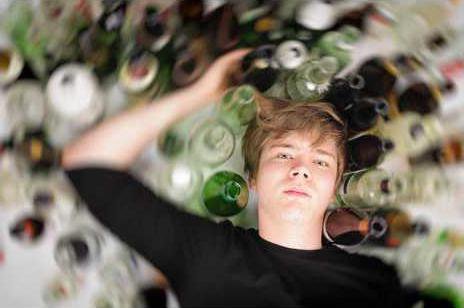Genetics, brain function and other factors hold promise of helping researchers predict which teenagers will become binge drinkers and abuse alcohol. A study just out in the journal Nature suggests scientists can teach a computer to make such a prediction with close to 70 percent accuracy.
But it's not a slam-dunk. The researchers note that "a comprehensive account of alcohol misuse must accommodate individual must accommodate individual differences in biology, psychology and environment and must disentangle cause and effect."
"It's sort of a deep mystery — why do some people become addicted and others don't," Hugh Garavan, associate professor of psychiatry at the University of Vermont, who was the study's senior author, told Maanvi Singh of NPR for the Shots blog.
The Centers for Disease Control and Prevention called underage drinking a "major public health problem," noting alcohol is more likely to be abused than illicit drugs or tobacco. CDC reports more than 4,300 deaths a year related to the underage consumption of alcohol. It said that those ages 12 to 20 drink 11 percent of all the alcohol consumed in America — 90 percent of it while binge drinking. Nearly 200,000 emergency-room visits by minors in 2010 were alcohol-related.
The nonprofit HelpGuide.org reports that the average age for boys to try alcohol is 11; for girls, it's age 13. CDC says underage drinking can contribute to a host of problems, from unplanned sexual activity to greater likelihood of vehicle accidents, injuries, health problems, drug abuse and more.
When the researchers examined a bunch of factors — including brain structure, personality and learning differences, environmental factors, life experience and genetics — their findings identified "life experiences, neurobiological differences and personality as important antecedents of binge drinking," the study abstract said.
Ultimately, figuring out what can lead to binge drinking and alcohol abuse could make prevention possible, they said.
The researchers based their findings on brain scans of 700 14-year-olds from different European countries, combing the scans with information on the youths' personalities, life experiences and genetics. In 2012, they used their findings to identify what they called "brain networks that predisposed some teens to higher risk behaviors like experimentation with drugs and alcohol."
They used the data collected when the youths were 14 to see if they could predict who, at 16, had gone onto problem drinking. They had that data available to vet their predictions. They were able to identify who went on to binge drinking, with 70 percent accuracy. They also confirmed the findings with tests on an entirely different set of teens, according to background information provided on the study.
For instance, wrote Arielle Duhaime-Ross for The Verge, the computer model "learned that smoking at age 14 merits a relatively high weighting, whereas pubertal development status at age 14 doesn’t."
"It’s a form of supervised learning," Whelan told her. "You tell the computer what are the two groups — either binge drinker or not — and it has to learn what features best distinguish them."
"It turned out that several factors helped predict which teens would end up binge drinking by age 16," Singh reported for NPR. "Personality was a big one — thrill seekers and those who lacked conscientiousness were more likely to binge."
"Notably, it's not the case that there's a single one or two or three variables that are critical," Garavan said in a written statement. "The final model was very broad — it suggests that a wide mixture of reasons underlie teenage drinking."
Among the most predictive, he noted, were personality, thrill-seeking traits, not being conscientious, or having a family history of drug use. Even consuming a single drink at age 14 was "a powerful predictor." Teens with backgrounds that included several stressful life events were more prone to binge drinking. So were those with bigger brains.
"There's refining and sculpting of the brain, and most of the gray matter — the neurons and the connections between them, are getting smaller and the white matter is getting larger," Garavan said. "Kids with more immature brains — those that are still larger — are more likely to drink."
Email: lois@deseretnews.com, Twitter: Loisco
Predicting which teenagers will be binge drinkers may be possible





